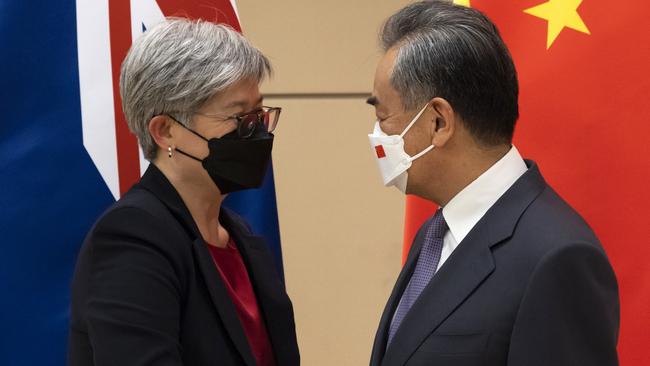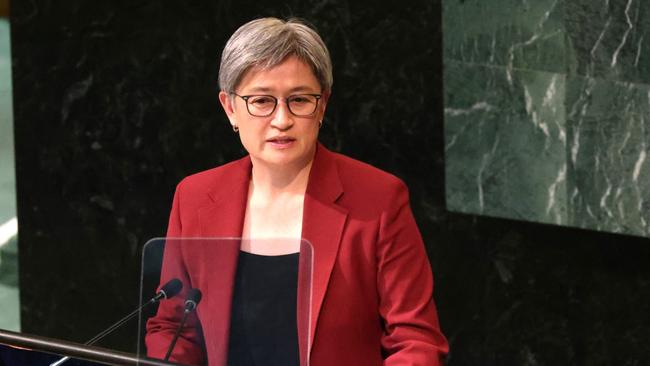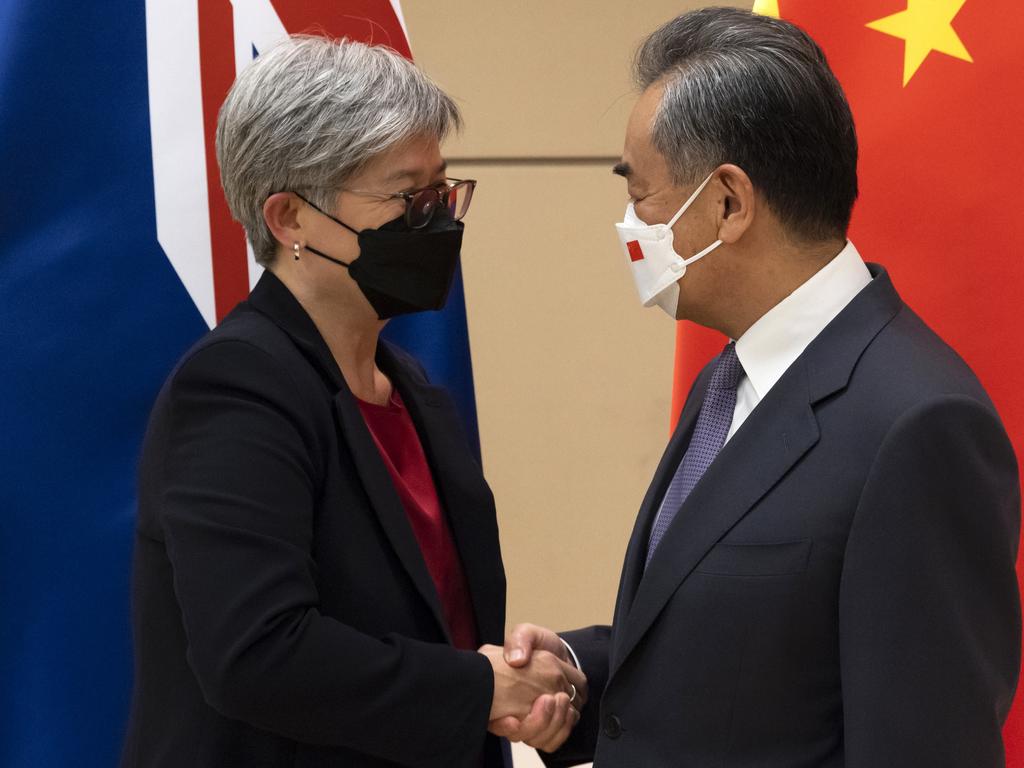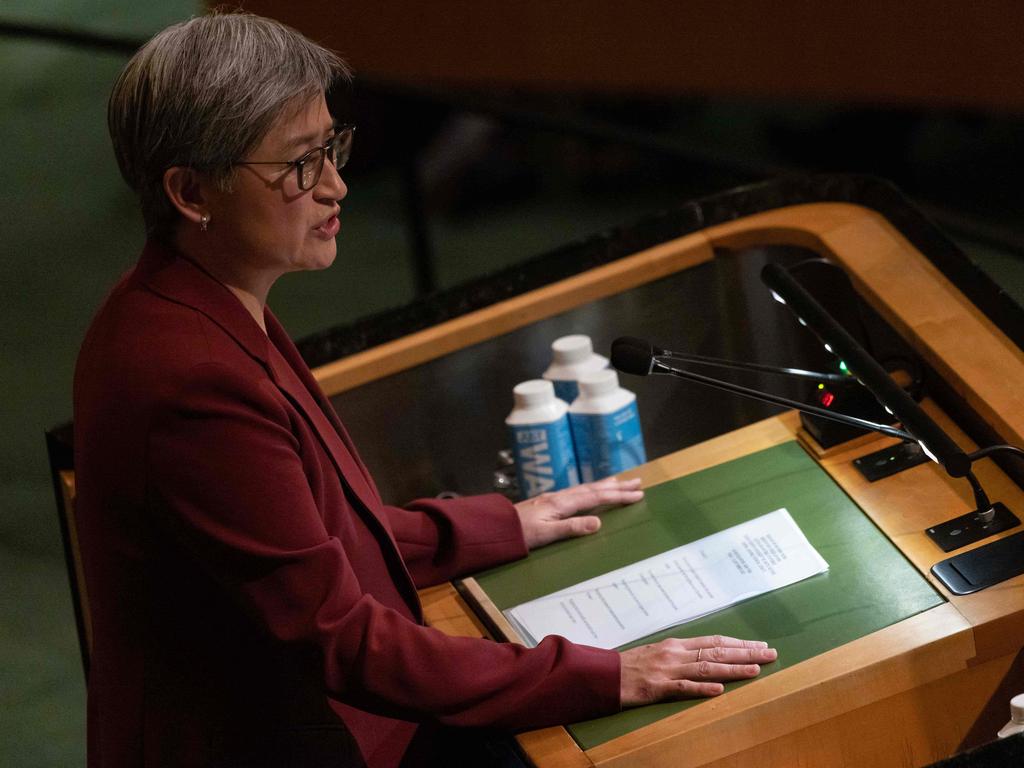
According to Beijing’s Ministry of Foreign Affairs, Wang upliftingly told Wong: “The two sides should meet each other halfway, uphold a more positive mindset, send more positive signals, tell more stories of win-win co-operation.”
Unreported in Australia was that “Wang Yi also expounded on China’s principled position on issues related to Ukraine, the South China Sea, and Xinjiang, among others”.
Make no mistake: Australia is not on the brink of a diplomatic breakthrough with China. The day before meeting Wong, Wang met with Russian Foreign Minister Sergei Lavrov. We know from Vladimir Putin’s awkward meeting with Xi Jinping in Samarkand on September 15 that China has “questions and concerns” about the war in Ukraine.
This was not evident in Wang’s meeting with Lavrov. According to the weird parallel universe that is the Chinese MFA, Wang told Lavrov: “The two sides should deepen strategic co-ordination, advance high-quality practical co-operation, take an active part in global governance, work together to address global challenges, push for an international order that is more just and more equitable, oppose unilateralism and power politics, and uphold justice for developing countries and medium and small countries.”
Wong is right to be sceptical about Wang’s comments and to say that Australia and China face “a long road in which many steps will have to be taken by both parties”.
My assessment is there is no prospect for Australia and China improving relations for as long as Xi remains leader of the Communist Party, President of the country and chair of the Central Military Commission – effectively the uniformed commander in chief of the People’s Liberation Army. The reason is because Xi’s China is on a fundamentally different strategic path to Australia. Xi wants China to become the dominating power in the Indo-Pacific. To achieve that, China is rapidly building its military forces and extending their presence across the region.
Beijing is trying to reduce American influence, bullying Washington’s allies and asserting its “right” to control all countries in Southeast Asia and the Pacific Islands.
That is Xi’s strategy. Anyone reading Xi’s speeches or the People’s Daily, or Communist Party statements or any PLA military journals will see that regional dominance is the party’s goal. Moreover, Xi is a man in a hurry. If he succeeds (as seems inevitable) in securing a third term in China’s top three jobs at the 20th National Congress of the Chinese Communist Party, the expectation is he will look to secure China’s dominating role in the Indo-Pacific within that five-year term.
This is why Australia, Japan, the US and many other countries in the region are concerned about the prospect of a mid-decade crisis over Taiwan.
War in the region is not inevitable but the prospect of conflict is higher now than since the most dangerous years of the Cold War.
It’s a mystery to me why many in Australia persist in believing Wang’s flatteries or talk about “win-win co-operation” holds out any real prospect for change in relations. To do so is to confuse diplomacy for strategy. In the hands of the Chinese Communist Party diplomacy is an instrument to achieve tactical advantage in pursuit of long-term strategic goals.
In this paper on the weekend, former Department of Foreign Affairs and Trade secretary Peter Varghese argued for a measured distancing in our relationship with the US.
Australia “has to learn how best to chart its own course and advance its own interests”. To Varghese that means questioning whether US strategic primacy is a vital Australian interest. He claims: “Nor is it an abandonment of the alliance to assert that the maintenance of US primacy, however desirable, is not a vital Australian interest.”

Oh really? I’ll look forward to seeing Wong and Richard Marles make that case at the next AUSMIN meeting.
DFAT has had little of substance to contribute to Australian strategic thinking for years. The department was missing at the table when the Pacific step-up, AUKUS and the revived Quad were designed. “Deepen strategic relationships in Southeast Asia” is a slogan, not a strategy.
“Charting our own course” is a recipe for middle-power mediocrity and irrelevance. On the back of American supremacy we underinvested in our defence capability for decades. Claiming now that American supremacy is not a vital Australian interest is absurd.
Rather than hoping against hope that diplomatic talking points buy more strength than American aircraft carrier battle groups, we need to work harder with our allies to reinforce deterrence and build our own defence capabilities.








Meeting Penny Wong at the UN in New York last week, Chinese Foreign Minister Wang Yi struck a note that Australian journalists took to signal a “diplomatic thaw”.